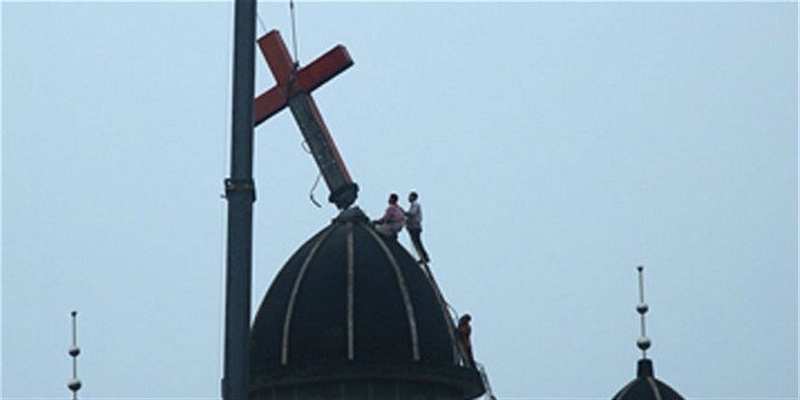
Authorities in the Chinese province of Zhejiang are working to ban rooftop crosses from all Protestant and Catholic churches in the latest in a string of attempts to clamp down on the growth of Christianity within the region.
"The authorities have attached great importance to this religious symbol," Zheng Leguo, a pastor from the province who now lives in the United States told the Associated Press."This means no more prominent manifestation of Christianity in the public sphere."
While the draft has not yet been approved, it will soon give authorities in the eastern province of Zhejiang legal permission to remove all rooftop crosses. However, the demolition process is already underway; in 2014, nearly 400 crosses and other religious symbols were forcefully removed from churches and other structures.
In April 2015, authorities removed the cross from a church in Cixi, a city of around 105 miles south of Shanghai, the Telegraph reports. Then, a cross was removed from the roof of the En Quan church in the neighbouring city of Ningbo, and a short time later, a third church, Qingyian Youzhu, was targeted in Lishui, another city in Zhejiang.
Chinese officials claim the campaign is an attempt to rid the region of "illegal structures" and has nothing to do with religion. "There is no such thing [as an anti-church campaign]," one official was quoted as saying by state media last year. However, Christians believe the demolitions are deliberate attacks on their faith.
"This new draft law is just another attempt by the government to legitimize its existing illegal violent campaign of destruction and removal of the cross," said Bob Fu of U.S.-based China Aid.
"To continue to forcefully remove and ban the cross on the rooftop of the church buildings demonstrates the Chinese regime's determination to contain the rapid growth of Christianity in China," he said in an email.
Most of last year's attacks on Christian structures took place in Wenzhou, a major coastal city often referred to as the "Jerusalem of the East" because of its large Christian population.
However, the New York Times notes that the more recent targeting of believers in Zhejiang, one of China's wealthiest provinces, highlights the Chinese leadership's discomfort with the growing allure of Christianity, whose followers are said to rival in number the 86 million members of the Communist Party. Despite continue pushback from authorities, Christianity is flourishing in China and remains the country's fastest growing religion.
Last August, Beijing authorities called Christian pastors and religious scholars into meetings to announce that the Christian faith must be free of foreign influence but "adapt to China"--or, obey the Communist Party.
A short time later, Chinese pastor Huang Yizi was sentenced to a year in prison for protesting the removal of a cross from his church, Fengwo Church in Wenzhou.
According to the AFP, Huang was arrested for "gathering crowds to disrupt social order" after he urged church leaders to replace removed crosses and criticized police violence on his blog, describing what was happening as "severe persecution".
The recent demolitions and continued persecution of Christians are a sign that "this evil campaign continues," Fu said at the time. "This ought to stop if China wants to earn the respect of the international community."














